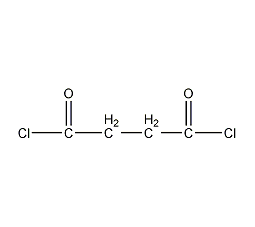
Structural formula
| Business number | 05LY |
|---|---|
| Molecular formula | C4H4O2Cl2 |
| Molecular weight | 154.98 |
| label |
Succinic acid dichloride, Succinyl chloride |
Numbering system
CAS number:543-20-4
MDL number:MFCD00000749
EINECS number:208-838-0
RTECS number:WN4900000
BRN number:507064
PubChem ID:None
Physical property data
1. Character: yellow fuming liquid[1]
2. Melting point (℃): 17[2]
3. Boiling point (℃): 190[3]
4. Relative density (water=1): 1.41[4]
5. Octanol/water partition coefficient: -1.290[5]
6. Flash point (℃): 76[6]
7. Solubility: Insoluble in petroleum ether, miscible in ether and benzene. [7]
Toxicological data
1. Acute toxicity No data available
2. Irritation No data available
3. Others[8] LDLo: 62.5mg/kg (mouse abdominal cavity)
Ecological data
1. Ecotoxicity No data available
2. Biodegradability No data available
3 .Non-biodegradability No information available
Molecular structure data
1. Molar refractive index: 30.33
2. Molar volume (cm3/mol): 111.5
3. Isotonic specific volume (90.2K ): 278.3
4. Surface tension (dyne/cm): 38.7
5. Polarizability (10-24cm3): 12.02
Compute chemical data
1. Reference value for hydrophobic parameter calculation (XlogP): 1.2
2. Number of hydrogen bond donors: 0
3. Number of hydrogen bond acceptors: 2
4. Number of rotatable chemical bonds: 3
5. Number of tautomers: none
6. Topological molecule polar surface area 34.1
7. Number of heavy atoms: 8
8. Surface charge: 0
9. Complexity: 96.6
10. Number of isotope atoms: 0
11. Determine the number of atomic stereocenters: 0
12. Uncertain number of atomic stereocenters: 0
13. Determine the number of chemical bond stereocenters: 0
14. Number of uncertain chemical bond stereocenters: 0
15. Number of covalent bond units: 1
Properties and stability
1. Stability[9] Stable
2. Incompatible substances[10] Water, alcohols, strong oxidants, strong alkali
3. Conditions to avoid contact [11] Heat, humid air p>
4. Polymerization hazard[12] No polymerization
5. Decomposition products[13] sup> Phosgene
Storage method
Storage Precautions[14] Store in a cool, dry and well-ventilated warehouse. Keep away from fire and heat sources. Packaging must beKeep it sealed and away from moisture. They should be stored separately from oxidants, alkalis, alcohols, etc. and avoid mixed storage. Equipped with the appropriate variety and quantity of fire equipment. The storage area should be equipped with emergency release equipment and suitable containment materials.
Synthesis method
Obtained from the reaction of succinic acid and phosphorus pentachloride. Add succinic acid, phosphorus pentachloride and anhydrous chloroform to the reaction pot in sequence. When the violent reaction slows down, heat to reflux. When all the reactants become liquid, evaporate the low boiling matter to recover chloroform, and then distill under reduced pressure to recover oxygen chlorine. phosphorus, further heat the residual liquid, continue distillation under reduced pressure, and collect the 95-110°C (2.67kPa) fraction, which is succinyl chloride. The yield is about 88%.
Purpose
1. Used in organic synthesis and as resin and plastic intermediates. [15]

 微信扫一扫打赏
微信扫一扫打赏

